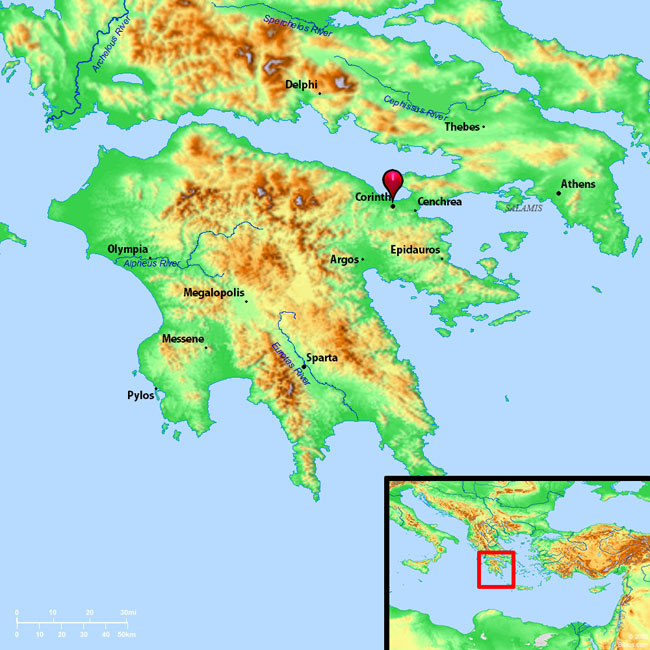Spiritual gifts part 5: Never underestimate how radical Christianity really is
Pastor-Teacher
John Farley
Sunday,
July 25, 2010
Never underestimate how radical Christianity really is
The Doctrine of Spiritual Gifts
Point 1: Setting the scene for Paul’s teaching on the Spiritual Gifts.
The most extensive treatment of the subject of spiritual gifts is found in Paul’s first letter to the Corinthians, chapters 12 through 14.
This problem was festering in the church of Corinth, and Paul addressed the problem head on with his teaching on the spiritual gifts.
This problem was disunity.
The word of God is a mirror, and, as we examine the ugly reality of the sin nature rearing its ugly head in Corinth, we will be looking at ourselves in our “flesh”.
As he looks at the present condition in Corinth, he keeps pointing back to the past, to Christ on the cross, and then forward to the future, to the Rapture and the eternal state.
Two of the best weapons in the arsenal of the Holy Spirit to oppose our flesh are the Cross and the Rapture.
The Cross humbles us, and the Rapture gets our priorities straight.
Paul wrote 1 Corinthians sometime in AD 53 or 54 when he was in Ephesus.
Most of 1 Corinthians is the apostle Paul correcting the church about different problems they are having.
What happened in Corinth stayed in Corinth.
Corinth was probably the largest city in Greece at the time Paul wrote his letter. It had a population of over half a million people.

Corinth was on an isthmus, and was called “the master of two harbors”.
There were always lots of sailors, merchants, traders and so forth.
Corinth was at a natural crossroads for both land and sea travel.
Given their complete lack of understanding of the cross, it is ironic that their wealth came from being at the heart of a geographic cross.
It was famous as a sports town, and a trading center.
Religion in the ancient world also had its own peculiarities.
There was a strong connection between, eating, drinking, worship of idols, and sex.
In the classical Greek period, 400 -500 years before Paul, Corinth was the center of the cult of Aphrodite, the Greek name for Venus, the goddess of erotic love.
The Greek term korinthiazomai (to behave like a Corinthian, literally) meant to practice fornication.
Corinth had a well-deserved reputation for immorality.
In 146 BC, Rome destroyed the city, killing the men and selling the women and children into slavery.
In 44 BC, Julius Caesar decides to establish a Roman colony on the site.
The Romans founded a lot of colonies. They saw it as a way to stop overcrowding in Rome and at the same time spread Roman civilization across the known world.
The Romans took their poor, former slaves, and their military veterans and “encouraged” them to resettle in colonial cities like Corinth.
All these Romans immigrated to Corinth, and you end up with a city that has a Roman identity.
One ancient writer referred to the early Corinthian settlers as “those often sold, unstable or disreputable slaves.”
America is the land peopled largely by the descendants of the discarded, the poor, and the slaves. Many of us “came from nothing” as well.
When you “come from nothing”, very often there is this drive inside to prove yourself, and then afterwards to show the world that you have made it.
Because it is humiliating to be poor.
It is no fun to be a prisoner.
It’s shameful to be a slave.
He took the form of a slave.
He became the prisoner of the Romans, and died the shameful and scandalous death of the cross.
He became poor so that you might by His poverty become rich.
Never underestimate how radical authentic Christianity really is.
When Paul came to Corinth to preach the Gospel of Jesus Christ, the city teemed with commerce as the vital link between Rome and its eastern provinces.
The city also hosted an important athletic event called the Isthmian games. This was something like the Olympics or the World Cup today.
Between the reigns of Augustus and Nero (the time of the life of Christ and the missionary journeys of Paul), there was a building boom in Corinth, so that it became “arguably the most dazzling and modern of Greek cities”.
The city was transformed from ruin to riches.
Many inhabitants were so affluent that “wealth and ostentatious display became the hallmark of Corinth”.
Ostentation =
the vulgar display of wealth.
Pretentious display meant to impress others.
Boastful showiness.
A display intended to excite admiration or applause.
Under the category of historical trends, we are in the last days, 2 Tim 3:1-5.
alazon = boaster, “one who makes more of himself than reality justifies”, or “promises more than he can perform”, often used in the ancient world to describe orators, philosophers, doctors, cooks, and officials.
a person who in every breath is talking about himself.
(courtesy of Pastor R.B. Thieme Jr.)